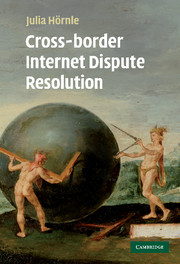Book contents
- Frontmatter
- Contents
- List of illustrations
- List of tables
- Table of cases
- Table of UK statutes
- Table of UK statutory instruments
- Table of European Communities legislation and documents
- Table of foreign statutes
- Table of treaties and conventions
- Acknowledgements
- List of abbreviations
- 1 Introduction
- 2 The concepts of fairness
- 3 Internet disputes
- 4 ADR and applicable law
- 5 ODR and access
- 6 Arbitration and due process
- 7 Internet disputes and fair arbitration
- 8 A model of dispute resolution for the Internet
- Bibliography
- Index
- References
2 - The concepts of fairness
Published online by Cambridge University Press: 30 November 2009
- Frontmatter
- Contents
- List of illustrations
- List of tables
- Table of cases
- Table of UK statutes
- Table of UK statutory instruments
- Table of European Communities legislation and documents
- Table of foreign statutes
- Table of treaties and conventions
- Acknowledgements
- List of abbreviations
- 1 Introduction
- 2 The concepts of fairness
- 3 Internet disputes
- 4 ADR and applicable law
- 5 ODR and access
- 6 Arbitration and due process
- 7 Internet disputes and fair arbitration
- 8 A model of dispute resolution for the Internet
- Bibliography
- Index
- References
Summary
An appreciation of unfairness develops early. A child of five, perhaps younger, is likely to know the meaning of unfairness … What any child might have more difficulty in doing is to give expression to the converse notion, the idea of fairness. Unfairness shouts out. Fairness goes unremarked.
(J. G. Riddall, Jurisprudence (London: Butterworths, 1999), 196)Introduction
This book is concerned with the fair resolution of Internet disputes. It is therefore necessary to define procedural fairness at the outset.
It is first necessary to distinguish procedural fairness from distributive fairness. The latter is concerned with the allocation of resources, whereas procedural fairness is not concerned with the outcome of the allocation but rather the procedure of getting there. Therefore, a theory on dispute resolution (such as the one set forth in this book) is about procedural fairness.
Fairness is an extremely amorphous and elusive notion, and it is frequently used in an emotive way. While most people have an instinctive idea about a procedure being ‘unfair’ or ‘unjust’, it is much more difficult to build a comprehensive concept of the converse: fairness in dispute resolution.
This chapter builds a concept of fairness using the building blocks of the traditional principle of due process, and relates this to general theories of procedural fairness. In doing this, the theory of fairness adopted in this book leans heavily on Rawls' theory of justice.
- Type
- Chapter
- Information
- Cross-border Internet Dispute Resolution , pp. 4 - 18Publisher: Cambridge University PressPrint publication year: 2009



